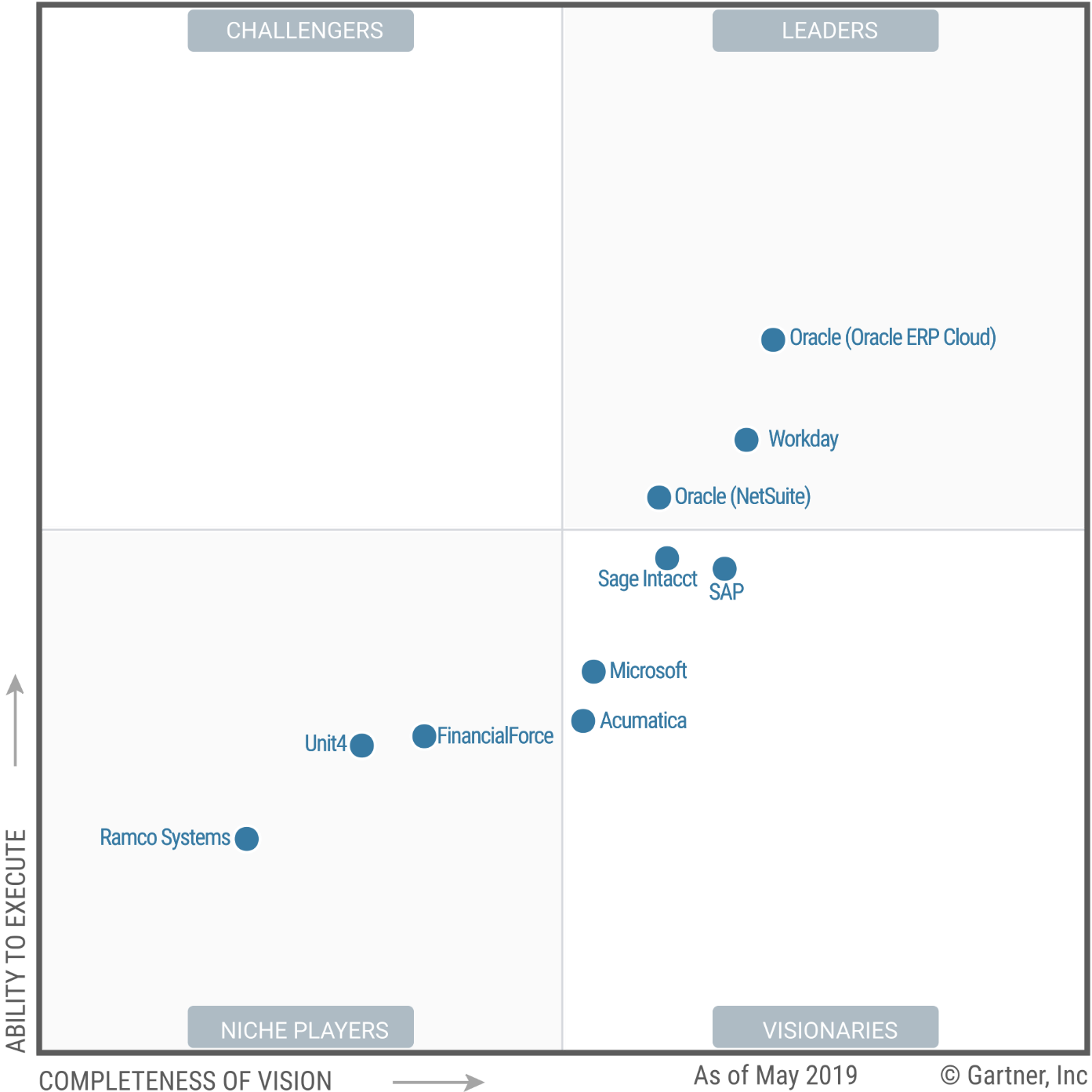For many IT departments, ERP systems have often meant large, costly, and time-consuming deployments that require substantial investments in hardware or infrastructure. Moving ERP to the cloud allows businesses to lower their support costs and quickly see a return on their investment.
In addition to being cost-effective, ERP applications in the cloud offer faster time to value, greater innovation, and better scalability. Today, cloud-based ERP applications are end-to-end solutions that have many of the same features and functionality as their on-premises counterparts. Additionally, cloud systems allow the easy integration of other key technologies like mobility, analytics, collaboration, and social tools.
As an Oracle customer, are you wondering if a SaaS solution like Oracle ERP Cloud is right for your business – or should you continue using Oracle E-Business Suite? We can help you decide.
What is Oracle ERP Cloud?
Oracle ERP Cloud is built on the Oracle Cloud infrastructure, which delivers all of the important features businesses need in a cloud platform, including high performance and scalability, greater reliability, and better security. Oracle ERP Cloud includes the following modules:
- Financials
- Revenue management
- Accounting
- Project management and finances
- Procurement
- Risk management
- Order management
- Inventory
Benefits of Moving to Oracle ERP Cloud
Leading Product Capabilities
For the third consecutive year, Gartner has named Oracle ERP Cloud a Leader in its 2019 Magic Quadrant for Cloud Core Financial Management Suites for Midsize, Large and Global Enterprises. Oracle ERP Cloud is a Leader due to its broad and deep financial management capabilities, international capabilities, and strategic focus on selling and marketing the solution in all regions.
Additionally, Gartner’s Critical Capabilities report rated Oracle ERP Cloud above average in all areas of functionality citing improved year-over-year scores in financial analytics and reporting, accounts receivable, and general ledger coding structures.
Magic Quadrant for Cloud Core Financial Management Suites for Midsize, Large and Global Enterprises

Lower TCO
One of the main reasons for moving any process or application to the cloud is reducing costs. Moving to Oracle ERP Cloud is much more cost-effective than on-premises counterparts.
Looking at software, hardware, personnel, and training costs over a three-year period, Nucleus Research identified that, on average, initial costs for on-premises ERP were 2.4 times higher than Oracle ERP Cloud.
A Complete Solution
ERP systems cover a number of back-office processes that are critical to your business. Moving to Oracle ERP Cloud enables you to deliver all capabilities according to the needs of your business. Using Oracle ERP Cloud, you can transform the following processes:
- Financials
- Revenue management
- Accounting
- Project management
- Procurement
- Risk management
- Order management
- Inventory
Continuous Innovation
Emerging technologies like blockchain, artificial intelligence (AI), machine learning (ML), cognitive computing, intelligent process automation, and the Internet of Things (loT) are set to transform finance.
Oracle ERP Cloud is updated every quarter with the latest emerging technologies, use cases, and best practices built into the software ensuring that it’s always up to date. In Oracle’s ERP trends report, 81% of Finance leaders cited the ability to stay current as of the top benefit of Oracle ERP Cloud. Organizations mainly moved to the cloud for economic benefits but once they moved to the cloud, the competitive advantage offered by new technology outweighed everything else.
Global Presence
The ability to do business in multiple languages, across many countries, and comply with regulations in every region, is critical for a global organization. Oracle ERP Cloud combines the power of a global ERP suite with transactional and reporting capabilities across a range of business flows and countries. This is especially important for global enterprises.
Deeper Insights
Oracle ERP Cloud can pull important data together from a wide range of sources, helping your decision-makers easily understand it using an intuitive analytics dashboard. When you’re able to combine data from multiple applications, you can get deep, valuable insights that can help you make informed decisions, faster.
9 Key Advantages of Oracle ERP Cloud vs. Oracle EBS
1. Significantly Lower TCO
Oracle ERP Cloud has no up-front license costs and lower maintenance costs when compared to Oracle EBS. While looking at total business costs (software, hardware, personnel, and training) over a three-year period, Nucleus Research identified that, on average, initial costs for on-premises ERP were 2.4 times higher than Oracle ERP Cloud.
2. On-Premises ERP Solutions Will Soon Become Legacy Applications
Heavily customized on-premises ERP solutions are being viewed as legacy applications. SaaS solutions that support operational ERP capabilities are maturing fast and are now viable for midsize enterprises and some large enterprises. According to Gartner:
- By 2020, nearly 60% of large enterprises with systems up for replacement will switch from traditional on-premises licenses to cloud deployments.
- By 2021, 55% of Oracle’s on-premises customers will have moved 80% of their on-premises capabilities to Oracle Cloud Applications.
3. Faster Time to Value
On-premise Oracle EBS implementations require significant IT effort and much of it is spent in installation and configuration of the existing, complex IT environment. Oracle ERP Cloud enables the organization to implement new functionality quickly and at a lower cost than Oracle EBS.
4. Easy Accessibility
Oracle ERP Cloud can be accessed via the internet anywhere, anytime and works on any mobile device – including your laptop, phone, and tablet. This is particularly useful when employees desire flexibility in their schedules and work environment.
5. Continuous Automatic Upgrades
The costs and effort associated with upgrades and new releases are higher in on-premises ERP solutions as the user has to buy an upgrade package and install it or pay for specialized services to perform the software upgrade. Oracle ERP Cloud gets continuous, automatic software updates whereas upgrading Oracle EBS requires significant time and effort from the IT team.
6. Scalability and Integration
SaaS solutions exist in cloud environments that are easily scalable and have integration with other SaaS offerings. Oracle ERP Cloud is engineered to enable a wide range of application integrations and provides this capability in a reliable architecture. Oracle ERP Cloud supports complex integrations as well as bulk data movement. This process isn’t so simple in Oracle EBS and needs extensive support from the IT team to design and build the integrations.
7. Improved User Interface
Oracle ERP Cloud features a complete redesign which makes the applications more streamlined and user-friendly. Cutting edge web technologies result in a simple, intuitive experience that makes it quicker and easier to perform most back office functions. On-premises Oracle EBS doesn’t include the revamped UI and feels outdated in comparison.
8. Oracle Cloud Marketplace
Oracle Cloud Marketplace is an online store dedicated to cloud business applications and professional services offered by Oracle Cloud partners. It is designed to help customers take advantage of Oracle’s growing ecosystem of partner applications and solutions. The integration between Oracle Cloud Marketplace and Oracle Cloud infrastructure, leveraging partner capabilities, can help you deploy the best solutions for your business needs.
9. IT Convergence’s Proprietary ERP Cloud Accelerator
IT Convergence’s Proprietary ERP Cloud Accelerator includes pre-built templates and processes that automate a significant part of your Oracle ERP Cloud migration. This rapid upgrade enables you to save time, lower costs, and gain maximum value from your Oracle ERP Cloud investment.




